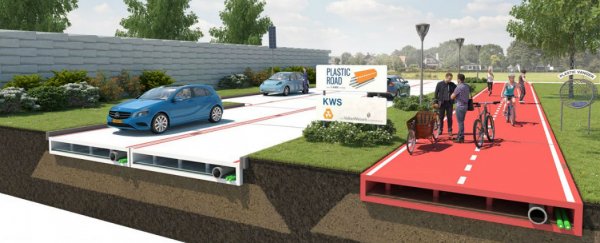Road surfacing may not be the first application that comes to mind for recycled plastic bottles, but Dutch construction firm VolkerWessels has plans to use the material for a pilot scheme in the city of Rotterdam. While the idea is still at the conceptual stage for now, the company says that its plastic, environmentally friendly roads could be in place within three years.
There are many benefits to using recycled plastic rather than asphalt for a driving surface: producing the material would have a much smaller environmental footprint; it would last longer; require less maintenance; and be able to withstand greater extremes in temperature. The plastic solution would be quicker to lay too, says VolerWessels, and the road would be hollow, leaving room for power and utility cables.
While asphalt does use some recycled materials - including used tyres, glass and blast furnace slag - generating the mixture is estimated to cause 1.45 million tonnes of global carbon dioxide emissions a year and 2 percent of all road transport emissions.
The recycled plastic surface, meanwhile, can be constructed off-site and then delivered to wherever it's required - that means less time sitting in roadworks for the general public and less of an impact on the environment as well in terms of the transportation of raw materials. Further down the line the surface could be developed to offer an ultra-quiet drive or even integrated heating (no doubt useful during a snowstorm).
"It's still an idea on paper at the moment," VolkerWessels' Rolf Mars told The Guardian. "The next stage is to build it and test it in a laboratory to make sure it's safe in wet and slippery conditions and so on. We're looking for partners who want to collaborate on a pilot - as well as manufacturers in the plastics industry, we're thinking of the recycling sector, universities and other knowledge institutions."
"Rotterdam is a very innovative city and has embraced the idea," added Mars. "It fits very well within its sustainability policy and it has said it is keen to work on a pilot."
Rotterdam has ambitions to make itself the most sustainable port city in the world and has a number of environmental initiatives both in place and in the pipeline. There's a green roof programme, for example, which absorbs water during heavy rainfall, as well as a plan for a tidal park that will improve the ecology of the Rhine–Meuse–Scheldt river delta and provide extra protection for the banks of the city. We can't wait to see how they do.
